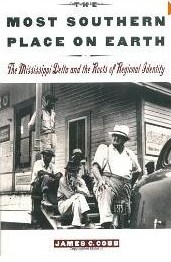James C. Cobb
The Most Southern Place on Earth
 Oxford Univertity Press, 1994
Oxford Univertity Press, 1994
A social history of epic and literary proportions.
It's a very readable book with lots of information about The Yazoo-Mississippi Delta all the way from Reconstruction to our modern Welfare times. The intervention of the Federal government to allegedly improve the status of blacks, whether it was at the wake of the War or by means of the New Deal, and up to the latest impulses of liberal Big Government, has never done any good: only shifted the paternalistic role from the white man to the welfare state. It's curious to see how blacks have reacted to this paternalism through the times. Unlike the prodigal son, he has it both ways: comes home to cash his welfare check, then goes out rambling.
Most revealing to me was the terrible impact of the 1967 one-dollar-per-hour minimum wage, the dream of liberal social scientists and planners. It made the black workers poorer, so much so that they had to borrow from the planters, which increased their dependency.
The book is most interesting because it is life from the ground, from the plantation and street; and it's also a cultural history, the American way: made by the common man and for the common man to read. Therefore it includes a succint but juicy chapter on the Blues, and another or the density of literary figures in the area.
It reads smoothly, without any academic jargon, left mostly to the voices of the characters themselves, their laments, their ambitions, their joys of some and pains of others. It's definitely the description of the lives of these people, blacks and whites, and letting us hear their own testimonies or anecdotes that make this an important book.
The following excerpt -to me, at least- says it all about what meant to live in the Delta:
“Finding himself in an elevator and carrying a load of packages, Richard Wright was assisted by a white man who took his hat off for him and placed it upon his packages. Wright explained that 'to have said “thank you” would have made the white man think that you thought that you were receiving from him a personal service. For such an act I have seen Negroes take a blow in the mouth. Finding the first alternative distasteful, and the second dangerous, I hit upon an acceptable course … pretended that my packages were about to spill and appeared deeply distressed … In this fashion I evaded having to acknowledge his service … and savaged a slender shred of personal pride.”
If that isn't stuff for a classic, what is then! Now figure thousands of possible situations in everyday life and what a panorama you get! Not material for teenage-minded Hollywood, for sure. No wonder so may artists and musicians nationwide got their inspiration from the South.
Here you get American History condensed in a few counties, like in a lab. History by the people and for the people. The history that counts.
